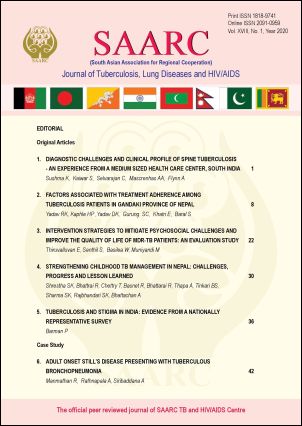Factors Associated with Treatment Adherence among Tuberculosis Patients in Gandaki Province of Nepal
DOI:
https://doi.org/10.3126/saarctb.v18i1.34128Keywords:
Treatment Adherence,, Tuberculosis,, NepalAbstract
Introduction: Poor adherence to the treatment regimen is a major cause of treatment failure and the emergence of drug resistance among TB patients. The emergence of resistance to anti-tuberculosis drugs and particularly of multi-drug resistance (MDR), Pre-extensively drug resistance tuberculosis (Pre-XDR) and extensively drug resistance (XDR) tuberculosis have become a major public health problem in several countries and an obstacle to effective global TB control.
Methodology: This research was health facility based cross-sectional study and carried out among TB patients registered under DOTS and receiving treatment more than or equal to 60 days from health facilities of Gandaki province of Nepal. Structured interview schedule and validated questionnaires were used for data collection. Treatment Adherence was assessed by using Nepali version of Morisky treatment adherence scale (MMSA-8) questionnaires. Data were entered in Epi-data software and analysis was performed with the help of the Statistical Package for Social Science (SPSS). The odds ratio with a 95%CI was calculated and a P-value of <0.05 was considered as cut off for statistical significance.
Results: A total 180 TB patients were participated in this study. The overall prevalence of treatment adherence among tuberculosis participants was 79.4%. Participants who haven’t living with comorbidities were more than four times more likely to adhere with medicine compared to participants who had living with co-morbidities. Similarly, who had friendly relationship with health workers were more than forty six and half times likely to adhere to medicine with compared to participants who had unfriendly relationship with health workers.
Conclusion: The supportive factors for treatment adherence among Tuberculosis patients were socioeconomic factors (Hilly region, hindu religion, nuclear family, literate), life style related factors (no prior alcohol consumption, not habit smokeless tobacco previously), diseases related factors (delay of confirming TB diagnosis, Not experienced side effects, aware about TB symptoms, no co-infection) and accessibility to health care facilities related factors (confirm TB diagnosis cost, favourable time for DOTS centre, health workers supervision during the medication, friendly relationship with health workers, know about the length of the treatment, TB status disclose).
Downloads
Downloads
Published
How to Cite
Issue
Section
License
Copyright © SAARC Tuberculosis and HIV/AIDS Centre (STAC), all rights reserved, no part of this publication may be reproduced, stored in a retrieval system or transmitted in any form or by any means without prior permission of the STAC.




